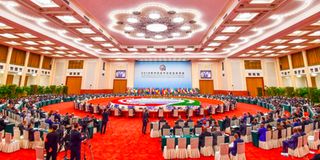New dialogue between China and Africa is spurring development

A gathering of African Heads of State and Government at a High Level meeting during the Forum on China-Africa Cooperation (FOCAC) 2018 Summit in Beijing, China.
In a recent article published in The New York Times (March 30, 2022), the American blogger, Ross Douthat argued the on-going Ukraine War and other contemporary world conflicts have echoes in Samuel Huntington’s (in)famous theory of global politics, “the clash of civilisations”.
In reality, the conflict in Ukraine is not a clash of civilisations. It is a proxy war between Nato and Russia, reflecting a unfinished Cold War rivalries within the Western civilisation.
That said, the million-dollar question, therefore, remains: is dialogue and harmony within and between civilisations possible in our anarchic post-liberal international order? It is in this context that a recent Conference: “Deepening Exchanges and Mutual Learning Between Chinese and African Civilisations”, jointly organised by the African Union and the Beijing-based China-Africa Institute (CAI) on April 9, rejected the clash of civilisations thesis. Instead, participants explored new frontiers in promoting the dialogue of civilisations to spur shared development in the post-Covid era.
From the Chinese civilisation comes the saying: “A journey of a thousand miles begins with a single step.” And from Africa comes the wisdom: “If you want to walk fast, walk alone. But if you want to walk far, walk together.” In the twenty-first century, China and Africa resolved to walk far, and together. The two civilisations embraced the trinity of ‘mutual co-operation’, ‘equal partnership’, and ‘solidarity’ to undergird their relations in our turbulent post-liberal international order.
Chinese sailors
China-Africa ties now build on the long history of exchanges between the two civilisations. Since the pharaonic times in ancient Egypt, Chinese sailors and traders made voyages to Africa. Similarly, African scholars and travellers visited China. The famous Moroccan scholar and explorer Ibn Battuta and his Somali counterpart, Sa’id of Mogadishu, made extensive tours of China. The two civilisations used the ancient “Silk Road” to forge binding ties.
After a long history of external conquest, occupation, exploitation, and humiliation, the two civilisations have re-mapped and recreated the old Silk Road as a new super-highway of inter-civilisational dialogue and exchanges in the era of globalisation.
In 2000, Africa and China launched the Forum on China – Africa Cooperation (Focac) as their premier policy forum. Today, over 47 African Union member states are participating in the Belt and Road Initiative (BRI) launched in 2013. Both Focac and BRI now form the twin-engine of cooperation in development between the two civilisations.
Out of adversity, they say, comes opportunity. The Covid-19 pandemic posed both a challenge and opportunity for China-Africa relations. Africa rendered support and assistance to China to fight the pandemic. In February 2020, the Executive Council of the African Union issued a communiqué in support of China’s anti-epidemic efforts. Similarly, 48 African heads of state and the chairperson of the AU Commission sent letters to express their support and sympathy to the Chinese people and donated money and supplies to China.
Inversely, when Covid-19 struck Africa, China and its charities such as the Jack Ma and Ali Baba Foundations sent in support to help the continent contain the pandemic. In his keynote speech to the 2021 Focac Ministerial forum in Dakar-Senegal, President Xi Jinping highlighted China-Africa solidarity in fighting Covid-19 as the central plank of the 2021-2024 Focac plan of action.
Massive resources
Solidarity calls for massive resources to contain the pandemic. At the Dakar forum, President Xi pledged an additional one billion vaccine doses to Africa. This includes 600 million doses as donations and 400 million to be provided through people-to-people exchanges such as joint production by Chinese companies and African countries. So far, this is the largest vaccine assistance plan undertaken by a single country to help Africa overcome the pandemic. China will also undertake 10 medical and health projects for African countries, and send 1,500 medical personnel and public health experts to Africa. This inter-civilisational assistance will help the African Union achieve its goal of vaccinating 60 percent of the African population by the end of 2022.
As part of China’s post-Covid recovery strategy, last year President Xi unveiled the Global Development Initiative (GDI) as Beijing’s new framework for providing global public goods.
Globally, GDI will assist the global community and United Nations achieve the 2030 Sustainable Development Goals. The initiative will help reverse the devastating impacts of Covid-19 on development, especially in developing countries. It will also address environmental degradation and climate change, promote green recovery, and harmonise development and the natural environment to realise the dream of an ecological civilisation.
In Africa, in January 2022, China’s State Councillor and Foreign Minister, Wang Yi launched the “Initiative of Peaceful Development in the Horn of Africa.” The initiative provides a new framework linking peace promotion and development in the turbulent Horn of Africa region where civil wars, terrorism, disease, and the effects of climate change have wreaked havoc on development and created poverty.
Prof Kagwanja is former government adviser and currently chief executive at the Africa Policy Institute. This article is an excerpt from a paper presented at an international conference on April 9





